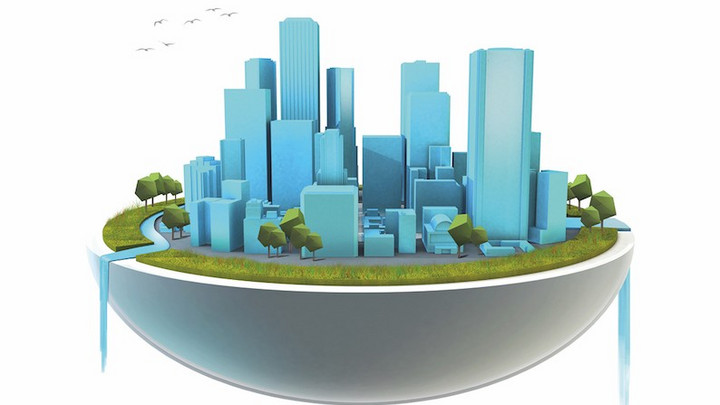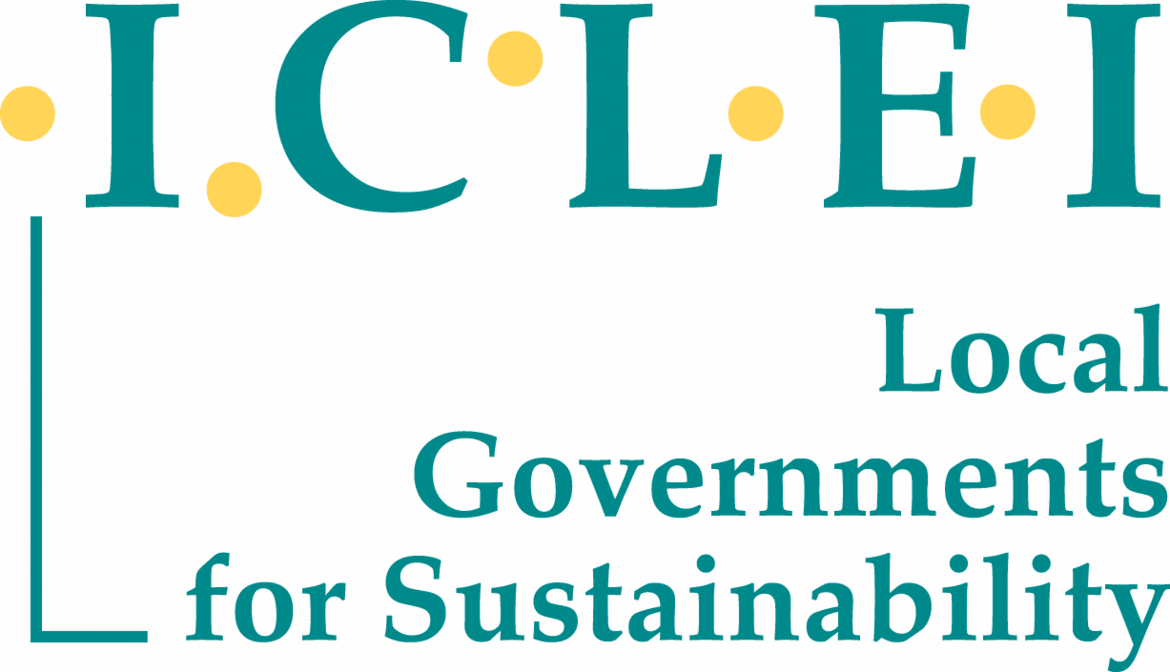Solving Tomorrow's Problems with Smart City Methodology - Transcript
While the image of smart cities is often portrayed as a utopian future, one of the main drivers behind the development is, according to Roman Mendle from ICLEI, the rather scary, dystopian forecast for urbanization over the next 20 years. dotmagazine spoke to Roman about the advantages of the smart city methodology, and how we need to change the way we conceive of urban spaces.

© Comomolas | istockphoto.com
Listen to the 13-minute interview here or download the audio for later
Transcript
DOTMAGAZINE: Roman, firstly, can you tell us a bit about ICLEI? Who are your members and what do you do?
ROMAN MENDLE: Gladly. ICLEI is a global association of cities, of local governments across the globe. So we have about 1500 cities in our network, with whom we work on anything related to sustainable urban development. So, essentially we are an association that is supporting cities with advocating their needs, from a local government perspective, for sustainable urban development in the international agenda. We support them in their policymaking, in technical aspects and implementation of sustainable urban development policies, and that across different sectors. So, in a nutshell, we have ten thematic areas, such as low carbon city, resilient city, eco-mobile city and smart city – that is one of them as well – through which we support cities in developing and implementing policies and technologies that support sustainable urban development and livable cities.
DOT: How does ICLEI define what a smart city is?
MENDLE: So, for us the smart city is a thematic area under which cities deal with digitalization as a global trend, and identify solutions for themselves to support sustainable urban development. It is important to say that when we define smart city, or the way that we define smart city at ICLEI, we do not look at it as a normative goal in itself. So, it’s not a label that you are working towards as a city to become as smart as possible, but rather a methodology through which you can achieve other goals. So for example, if you want to become a bio-diverse city, or if you want to become a low-carbon city, you can look at smart city methodologies and technologies to help you in achieving this kind of goal. This is very key for us, because we do not see digitalization and the use of ICT as something that you strive for as an end in itself.
DOT: So what are the greatest challenges for cities, in your eyes, in transforming into a smart city?
MENDLE: There's a wide range of different challenges, I would say. One is that cities at the moment have a challenge around navigating the space of smart cities and digitalization, with both the advantages and solutions that come from that space and the amazing technologies and technological progress that is made there. Identifying things they can use to improve the operations, to improve the urban metabolism – so, the flow of different materials, and goods, and people throughout the city – making those more efficient is one end. Because cities don't traditionally have the capacity to fully understand what they can use effectively towards their goals. And then on the other hand, with digitalization there comes a variety of different challenges as well, because digitalization is a trend that shapes cities and transforms them fundamentally, whether they want it or not, in very different aspects. So, if you think about the use of digital technologies for people, for example, if you think with a smartphone, there too how people move through a city, how they spend their time, how they live, work, and play in the city. This has a tremendous impact on modern life and what the life in a smart city, in that sense, will be like.
There's also these negative aspects, or at least discussions to be had on where a city wants to go in the digital space – how important is privacy for you? How important is data security for you? And also how important is the question of additional infrastructure when you overlay the city space with digital technologies and the physical infrastructure you need for it, what kind of impact does that have for the sustainability of the city, with the additional resources that go into it, with the energy use that comes with digital technologies as well? So all of these kind of aspects are part of that digitalization discussion for a city, and local governments specifically are in a space where they have to first capacitate themselves towards actually working with these kind of trends and deciding on what they want for the citizens and how to implement that.
DOT: So looking at some of these challenges, how can they be solved effectively?
MENDLE: To my mind and, I would say, speaking to the mission of ICLEI in that space as well, it is very important for us to put these kind of challenges as a discussion item on the global agenda, and on the agenda of cities, to make people aware that digitalization is something that has to be looked at from very, very different angles. Not only from the question of what kind of solutions can I implement, and who is paying for them, and these things – which are a bit more prevalent in the smart city agenda – but also from the side of where do we want to go with this. As I was describing, that's one of the challenges for a city and would be one of the first steps.
So for us, we are working towards having the cities in the ICLEI network be more aware of these kind of challenges, to discuss them amongst themselves, but also to discuss them of course with the private sector and solution providers that have a lot of the expertise that cities need to know of and to understand in that space as well. To give you a concrete example, if you have a city that is trying to improve their traffic flows, their traffic management, there's a lot of smart technologies out there, starting from sensor networks that you can install that help you monitor your traffic flow and improve the efficiency, that can give you information that you can use for decision making for city planning as well. These kind of things are very good in terms of looking at them as solutions, but at the same time you need to have a dialog between cities on what they really want and what they really want to achieve, and then they need to be able to communicate that also towards the solution providers, so that you can have meaningful dialog with private sector companies, for example, that are out there providing these solutions, so that they meet the needs of the city.
And these two challenges, first the dialog among cities, and then the dialog between cities and solution providers, so to speak, the supply and demand side of the city's market, if you will - this is really important, and one of the key things that we strive to overcome in that space is to help both sides speak the same language. So essentially, trying to help cities define the challenges that they have, and the demand that they have in a way that the private sector can understand it. And also for private sector solution providers to be more capacitated to answer the actual needs of the city, not just on the level of one technological component, one technological solution, but to put it in context, to be able to look at cities' needs and tell them what kind of problems they can solve with the technology they're providing.
DOT: So, you're talking there about dialog between cities and between public and private sector. What kind of partnerships should cities be establishing to become successful as a smart city?
MENDLE: Again, I think this is a space where you can think of all kinds of partnerships. Of course, there's a wide variety of organizations that can probably help with the top level of that discussion that I was mentioning, that is needed between cities in that space. There's a lot to be said about the need for exchanging knowledge, exchanging first experiences in the smart city space, talking about pilot projects and solutions that have been tested in certain cities, and how that went, both from the aspect of success stories, but also from what can be learned from maybe failed attempts as well. And I would say that this is also speaking a little bit to what we're trying to accomplish here at ICLEI, as a city network that fosters international collaboration on both levels.
The other thing is that there needs to be partnerships with the private sector that start much earlier than the usual discussion between the market supply side. So, ICLEI has long-standing experience of working in the public procurement space, so the question of how cities can actually operate on a market and procure solutions. But the question of advocating cities and the private sector to work better together needs to start far away from that discussion and much earlier, in terms of having partnerships that are more on a dialog basis, where companies understand cities better, cities understand companies better, and exchange information before you start, so to speak, getting down to business in that sense. So this is another one that I would say.
And then thirdly, I think it is key to look at the stakeholder side of what cities are. For example, in this interview, and also in some other contexts, it is very easy for people like us to use the words city and local government interchangeably. That's actually not correct. Local governments are not the city in themselves. Of course, there are the people, there's the companies that operate within the city, there's also stakeholders like universities, for example, the whole academia aspect, since the question of digitalization and also smart cities is essentially a discussion that we need to have on a society-wide basis. That means that for cities, there's much to be said for the need for the inclusion of different stakeholders from academia, from the citizens, to actually come to that conclusion of what is it that the city wants, what do we as citizens want from our city, where do we want to live, and then to have need for inclusive partnerships around that as well. So these would be three examples that I would say are very key in the smart city space.
DOT: So finally, Roman, what do you think will be the strongest force for change in cities in the future?
MENDLE: I think I would still mention digitalization now as a global trend, and if you look at that as a force for change, then I think this will be a very key one in the smart city space. There's a lot happening at this moment. The reason why we have the concept of smart cities, that is maybe somewhat more problematic to define than some other ideological concepts, is exactly the perception that cities are changing rapidly in terms of the technology that comes over them at the moment, and the technological progress that drives all of this. So, I think this is a very key aspect to look into and that cities also need to be aware of and be able to manage. But, of course, at the same time, I would say maybe even a bigger force for change could be if you look 20 or 30 years into the future. With the global development agenda, in essence you can see that there is a lot of ecological challenges, a lot of problems that come with resource efficiency, with the way that we build cities, that will drive the change of cities drastically. And this is definitely underlined by the fact that urbanization is a very scary trend at the moment. We are looking at a doubling of the urban space, essentially, by 2050. So this means we have to build, humanity has to build the exact same amount of urban space that we have built over the last, say, four thousand years of human history, we are going to build this again in the next 20 to 30 years, which is a very scary figure.
So I would say, despite the trends like digitalization, like the ecological pressures that come alongside of the environmental discussion that we are needing very much, one of the key driving factors in essence is urbanization, doubling up that space, and of course that will change the lives of everyone, at least in the way that we have to conceive and think of cities.
Roman Mendle manages ICLEI's Programs on Smart Cities Program and City-Business Collaboration, enabling cities to navigate the smart cities space and to evaluate solutions to sustainability challenges through demand-driven interaction with the private sector. He also supports industrial legacy cities to transition towards sustainability through the Urban Transitions Alliance. Roman has an MSc in Sustainability Science, a BA in East Asian Economics and Politics focusing on China, and a university certificate in Energy Economics and Mining Law.
Please note: The opinions expressed in Industry Insights published by dotmagazine are the author’s own and do not reflect the view of the publisher, eco – Association of the Internet Industry.



